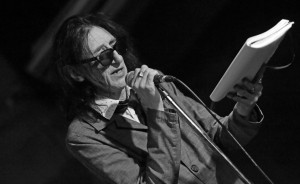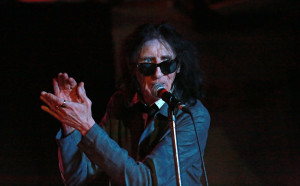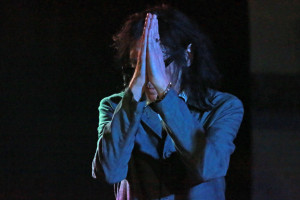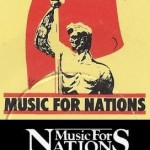 As the last strains of ‘Love Will Tear Us Apart’ fade away and The Clash’s former road manager Johnny Green moves across the Fibbers stage to introduce this evening’s star attraction, we are reminded of at least part of John Cooper Clarke’s past.
As the last strains of ‘Love Will Tear Us Apart’ fade away and The Clash’s former road manager Johnny Green moves across the Fibbers stage to introduce this evening’s star attraction, we are reminded of at least part of John Cooper Clarke’s past.
Yet even before the great punk poet first hove into the wider public consciousness in the late 1970s and early 1980s when he toured with bands like the Sex Pistols, The Clash, Joy Division, The Fall and New Order, Clarke had already tried to make it in the world of cabaret compèring shows in his native Manchester.
You sense that these early experiences and a subsequent decade lost to heroin addiction have played no little part in his indefatigable spirit and his unbridled enthusiasm to still want to get out there, doing it night after night at 66 years of age.
Clarke still bears more than a passing resemblance to Bob Dylan as the American folk singer embarked upon his epochal 1966 world tour; all pipe cleaner thin, impenetrable shades and that wild shock of hair that is as dark as a raven’s wing. And whilst over the years his routine may have shifted away from poetry and more  towards stand-up comedy, it too remains fundamentally the same.
towards stand-up comedy, it too remains fundamentally the same.
As Clarke himself succinctly puts it “there is some new shit mixed in with some old favourites”. In terms of the former we get the Kafka-esque oppression of ‘Camarad Klaak’ and ‘Get Back on Drugs You Fat Fuck’, his withering response to those fellow junkies who railed against him when he finally got clean and whose explicit title is fairly self-explanatory.
With regards to the latter, ‘Hire Car’, ‘Twat’ – where the audience to a man and woman shout out the poem’s final word in perfect unison – ‘Pies’, dedicated to all the ladies in the house and with its riotous refrain of ”you’ll always get a guy with a pie”, and his immortal, cacatopian view of urban Britain in the seventies, ‘Beasley Street’ (splendidly juxtaposed tonight with its more contemporary companion ‘Beasley Boulevard’) still remain every bit as caustic, insightful and hilarious as they have ever been no matter how many times you may have heard them over the years.
Each and every one, whether or old or new, Clarke rattles off in his inimitable machine-gun style, his Salfordian vowels undiminished by having spent the last twenty years living in Essex. And each and every one contains his existential eye for the smallest of detail, the idiosyncrasies of human behaviour and astute social commentary.
In between his poetic salvos, Clarke vacillates between wild generalisations and prejudice, lining anyone and anything up in his crosshairs from Eskimos, the Scots and the Chinese – where two contrasting officers of the law are described as being “sweet and sour cops” – to Terry Pratchett, Bill Oddy and people with eating disorders.
 Whilst some may find Clarke’s comments offensive, that would be too lose sight of his clearly deep love of humanity, undoubted humility and charm and the fact that his jokes are consistently delivered with a huge smile on his weathered face.
Whilst some may find Clarke’s comments offensive, that would be too lose sight of his clearly deep love of humanity, undoubted humility and charm and the fact that his jokes are consistently delivered with a huge smile on his weathered face.
There is also great poignancy in many of Clarke’s observations on life, particularly when he reflects upon the issues of ageing and mortality. He may well joke when he says that he now never buys green bananas or that his blood type was cancelled last week, but you do feel that he faces his own future with great trepidation and uncertainty. His re-enactment of Chet Baker’s ‘Look for the Silver Lining’ in the guise of some nightclub crooner is deeply moving.
Clarke finishes the set with his own personal favourite, ‘Evidently Chickentown’, a poem about the monotony and repetition of everyday life and which brought him to an even wider audience through its appearance in the sixth season of The Sopranos.
John Cooper Clarke’s encore of ‘I Wanna Be Yours’ is a heartfelt paean to love. It has not only been a mainstay of GCSE English for many years now but it also provides the lyrics to the final song on Arctic Monkeys’ chart-topping fifth studio album AM, all of which merely goes to show the sheer expressive beauty of modern language and the great man’s wider impact upon popular culture.
This review first appeared in York Mix on 24th February 2015




